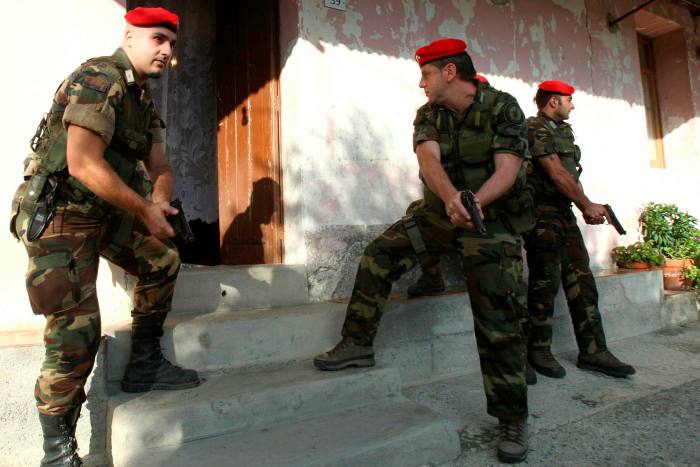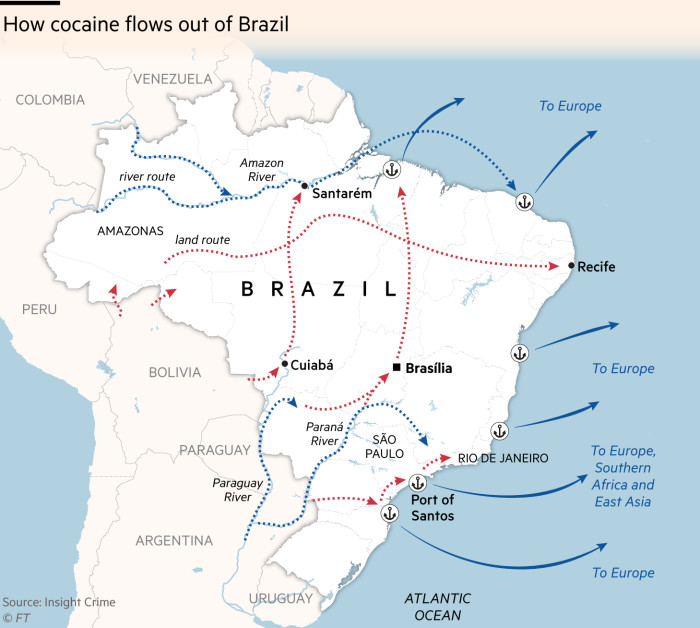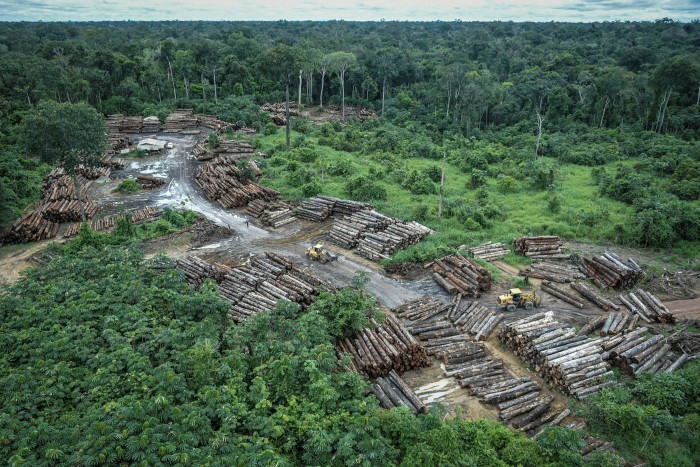How Brazil’s largest crime syndicate built a global drug empire

At any given moment, Lincoln Gakiya is protected by no fewer than 10 police officers — eight special battalion troops, armed with assault rifles, and a further two or three in plain clothes. The state prosecutor from São Paulo has “no doubt” he is the most threatened man in Brazil.
“The police have risk classifications and mine is at the maximum,” says the 55-year-old father of two. “It makes life very restrictive. I can’t travel, I can’t go to bars or restaurants. We mostly end up just staying at home.”
Gakiya’s cloistered personal life is a consequence of his profession. For almost 17 years, he has investigated what has now become the predominant organised crime syndicate in South America — the Primeiro Comando da Capital or First Capital Command. For many, it is known simply as the PCC.
Founded almost three decades ago as a prison brotherhood to protect inmates in São Paulo’s brutal penitentiary system, the group has today evolved into a multinational mafia, with an estimated 40,000 members and a diversified revenue stream that generates upwards of half a billion dollars every year, according to São Paulo state prosecutors.
Long the criminal hegemon of São Paulo — the largest city in the Americas — the group has expanded its dominance across Brazil over the past decade, outflanking for the most part its main rival, the Rio de Janeiro-based Red Command, in a violent nationwide turf war.
Along the way, the PCC forged commercial ties with the region’s underworld, striking deals with Bolivian farmers to supply cocaine paste and ex-Farc guerrillas in Colombia to provide training and arms. In the tri-border area between Brazil, Paraguay and Argentina, it teamed up with Lebanese syndicates — which some Brazilian authorities believe have links to Hizbollah — to launder money, according to prosecutors and federal police.
During this period, the syndicate’s focus was almost exclusively on selling drugs to the Brazilian market. That has now changed, investigators say. In the past three to four years, the PCC’s export business has gone global.
Following a tie-up with Italy’s ’Ndrangheta — arguably the most powerful organised crime group in the world — the PCC has begun exporting cocaine to Europe and reaping bumper profits, says Gakiya. It has established transshipment points in west and southern Africa to diversify risk. In the US, authorities have detected the PCC’s presence in multiple states.
It has also established new revenue streams. Police say it is behind a surge in digital crimes, including WhatsApp scams that every year ensnare millions of Brazilians, typically by cloning their accounts and then requesting money from their contacts. It is also moving into environmental crime, with PCC members an increasingly prominent presence among illegal gold mining groups in the northern reaches of the Amazon rainforest.
“I can’t emphasise enough how much the PCC has grown. It has become much richer and a lot bigger,” says Leonardo Romanelli, an intelligence officer at the state prosecutor’s office in São Paulo. “They have become much more sophisticated in their overseas trafficking. Until 2017, there were the Paraguay and Bolivia routes, which were drugs for consumption in Brazil. However, since 2018-2019, the PCC have become a very large international player.”

In recognition of the PCC’s growing clout, the US Treasury Department in December announced sanctions against the São Paulo-based syndicate — the first such measures imposed against a Brazilian crime group. “It has forged a bloody path to dominance through drug trafficking, as well as money laundering, extortion, murder-for-hire, and drug debt collection,” the Treasury said.
With the PCC surging in strength, security experts now fear Brazil is at the beginning of a process of state capture, with the syndicate using its wealth to influence and corrupt local and national politics as well as the judiciary and police. Some worry that the PCC has become too big to tackle.
“I hope Brazil doesn’t become a Colombia of the 1990s or like Mexico now,” says Gakiya from his office in the city of Presidente Prudente in the interior of São Paulo state. The door and windows around him are armoured.
Rafael Alcadipani, a crime expert with the Brazilian Forum on Public Security, puts the situation even more starkly: “The PCC is the largest threat to the Brazilian state. If we don’t do anything, we can become a narco-state.”
From prisoners to professionals
The group traces its origins to 1992, when police stormed the Carandiru Penitentiary near central São Paulo to quell a riot. The botched operation left 111 inmates dead. Images from the scene showed rows of naked corpses and decrepit cell blocks awash in blood.
The massacre was a call to action for the prison population of São Paulo. After launching the following year with an initial handful of members, the PCC expanded rapidly, fashioning itself as a “brotherhood” to protect inmates from the excesses of the state. Members were required to pay dues and in exchange they would be “baptised” as an irmão — a brother.
Home to hundreds of thousands of inmates, typically living in squalid, violent conditions, the prison system proved a fertile recruiting ground.
“In this world behind walls, almost a new city emerged. The prison system was a place where they became stronger. The more you arrested people, the more powerful the PCC became,” says Bruno Paes Manso, a researcher at the University of São Paulo and author of A Guerra, a book on the PCC.
The organisation quickly segued into drug trafficking, buying raw materials from suppliers in Bolivia and Paraguay, before processing cocaine and crack cocaine for sale in São Paulo, a state with a population of 44mn.

During this period, the PCC waged open war against the state authorities, notably in May 2006 when it launched almost 300 attacks against civilian and security targets over the course of one weekend, forcing the local government to implement curfews and lockdowns. Banks were robbed and police precincts attacked by waves of PCC members. Dozens of buses were set ablaze across the city. The wave of violence was co-ordinated from the prisons via mobile phones.
Since then, however, investigators and security experts say the PCC has increasingly eschewed direct confrontation with the state in favour of a quieter, more organised approach, which can generate larger profits. “They realised they needed predictability, so they started to become more professional, they started to talk about money, about profits,” says Paes Manso.
“They remain innately violent but they’ve changed the way they exercise violence,” adds Romanelli, pointing out aggression today is directed less at the state than at its domestic rivals.
Central to the professionalisation of the PCC was the expansion of their system of sintonias, or organisational divisions responsible for a specific area. There were three basic sintonias to begin with: drug trafficking, internal discipline and support for arrested members. Over time, the structure expanded to include sintonias for legal support, accountancy and female members.
In 2014 the group created the General Sintonia for States and Nations, a dedicated division to lead the national and international expansion of the PCC, and sent out coordinators to open up new markets.

On a national level, the strategy triggered a surge in gangland bloodletting as the PCC competed for territory in Brazil’s north-east and Amazonian regions against local syndicates as well its chief national rival, the Rio-based Red Command.
But its international expansion was the real game-changer, as it entered into an alliance with the ‘Ndrangheta in Italy. By selling its product in Europe and earning euros, the PCC has exponentially boosted its profits and strength, investigators say.
The PCC buys the base paste, or the extract of the coca leaf, for about $1,000 a kilo, Gakiya explains. Each kilo can be processed into two or three kilos of cocaine, which retails for about €35,000 in Europe. He estimates that the PCC ships at least a tonne per month from São Paulo or from other ports it controls in the south or north-east of Brazil.
“From the moment it arrives in Europe, the mafia is responsible for rescuing the drugs from ships, which it does in various ways,” says Gakiya. “If the PCC sends a tonne, the mafia’s cut is 400kg.”
It’s a low risk business for the PCC, he adds. “If a shipment gets caught, they only lose the drugs. No one goes to prison. And [if successful] they receive the money in euros.”

Investigators in São Paulo estimate the group has an annual turnover of around $500mn, Gakiya says. “Can you imagine the profit?”
Independent security experts estimate the figure could be even higher given that the size of the Brazilian cocaine market is estimated to be worth billions of dollars and the PCC controls the lion’s share of it.
A joint study by InSight Crime and the American University’s Center for Latin American & Latino Studies points out that in 2020 federal police tracked more than $5bn in ill-gotten assets — including vehicles, homes and boats — as part of anti money laundering investigations against the PCC.
The structure of the brotherhood
Unlike traditional Latin American drug cartels, which typically have one clear boss, power in the PCC is diffused through a broader top leadership.
At the apex of the pyramid is an advisory board of six or seven senior figures, who must sign off on big decisions, such as whether to launch a war or open a new frontier, says Romanelli. This board includes Marcos Willians Herbas Camacho, also known as Marcola, who for decades has been the public face of the PCC. He is serving a sentence of 332 years in prison for crimes including murder and drugs trafficking.
In 2019, authorities succeeded in incarcerating every member of this top echelon in federal penitentiaries without access to mobile phones. This has complicated the group’s decision-making, investigators say, and has resulted in power filtering further down the chain of command.
Below the advisory board, there are some 50 to 100 regional leaders scattered across South America. Below them are the thousands of often very young, very poor foot soldiers.
“There are two PCCs. The base that is very, very poor. They live in slums. They are more than 95 per cent of members. Then there is the second PCC, [the top] they live in the best neighbourhoods of São Paulo, Brazil, Paraguay,” said Romanelli.

Members are still known as “brothers” and they implement laws and rules in the communities they control. This includes so-called crime tribunals, where PCC members judge cases and hand out sentences, including the death penalty.
Authorities say this type of criminal governance tears at Brazil’s social fabric, although many living in these communities argue it brings order where there was none before.
“Did the PCC make the community more organised, less violent? Yes, I think so,” says a pastor of an evangelical church in Paraisópolis, one of the largest favelas in São Paulo. “It brought respect and limits. It brought organisation. It managed to do what the government couldn’t.”
Paes Manso says this adherence to a codified set of rules has been the foundation for the PCC to expand rapidly nationwide. It became a type of government for the underworld and for poor communities where the Brazilian state had barely been present.
“The PCC is a kind of regulator of the criminal world. They bring a credibility to the rules. Everybody obeys the rules. And the strength comes from the network.”
‘A plc of crime’
As the syndicate has grown, it has diversified its business interests. While its predominant focus remains drug trafficking, it is increasingly moving into digital and, notably, environmental crimes.
Illegal mining in the Amazon rainforest offers the PCC a trifecta of opportunities: direct profit from the gold, the extortion of miners and opportunities to launder money.
“Several members of the PCC are involved in mining and it is suspected that this has to do with a new way of funding the organisation, using an activity that is not as repressed as drug and arms trafficking,” says a federal police officer in the Amazonian state of Roraima. “There have also been several complaints from miners about extortion by alleged members of [the PCC] — they are charging for ‘protection’.”
The Amazonian gold industry is notoriously unregulated and many experts see it as an obvious way to launder money. Like many criminal groups, the PCC long struggled with how best to clean its cash. At one point in its early years, the group resorted to burying millions of dollars underground.
It then moved on to petrol stations, vehicle sales and car valets — simple front operations that could easily absorb dirty cash. “Nowadays,” Romanelli says, “they are using cryptocurrency and . . . gold.”

Today’s PCC operates like a corporation, Gakiya says, dividing tasks into directorates with a proven track record of transnational operations. “It is like a big company. A plc of crime.”
This growing clout, however, has made it an increasingly unavoidable presence in Brazilian life. Investigators and other experts say the PCC has begun to infiltrate and corrupt elements of the Brazilian state, much as drug cartels did in Colombia in the 1990s. “It has been especially successful corrupting police and prison guards. But now it is infiltrating even the judiciary and the prosecutor’s office,” says Gakiya.
“They are operating more in the corruption style,” Alcadipani adds. “They are getting involved in parliament. They have a lot of money: they corrupt police, politicians, judges . . . Everyone who seems to go up against the PCC has problems.”
It is a reality known all too well by Gakiya, the prosecutor who lives behind high walls and bulletproof glass. The standing order on his head will follow him into retirement and old age, he says.
“They say they don’t forget and since they’re already in prison they have all the time to make it happen. It’s something that really makes our lives quite complicated.”
Additional reporting by Emily Costa
Source link



